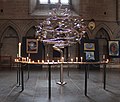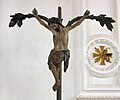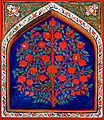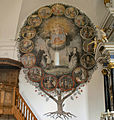ノート:天までとどく木
en:Yggdrasil extensions for international insertions in all wikipedias
[編集]Historical roots
[編集]
The historical roots of the nordic en:world tree are going back to en:indogermanic times, because the en:world tree is owned by the fund of many indogermanic tribes:[3] Balten (the oak en:Austras Koks), indians (the banyan tree en:Ashvattha), persian (en:Simurgh Tree) and slav – also the Tree of the Hesperides of the Greeks. In this mythologies is most a bird of prey at the top and/or a snake on the roots. In the zircumpolar schamanistic cultures of the euro asiatic north similiar imaginations can be found of the world tree, like reported from yggdrasil. [4] The world tree is also represented in the mythologies and en:folklore of en:Northern Asia and en:Siberia. In the mythology of the Samoyeds, the world tree connects different realities (underworld, this world, upper world) together. In their mythology the world tree is also the symbol of Mother Earth who is said to give the Samoyed en:shaman his drum and also help him travel from one world to another.
The symbol of the world tree is also common in en:Tengriism, an ancient religion of en:Mongols and en:Turkic peoples.
The world tree is visible in the designs of the en:Crown of Silla, en:Silla being one of the en:Three Kingdoms of Korea. This link is used to establish a connection between Siberian peoples and those of en:Korea.
Less deputized is that the christmas tree is reaching only backwards to 16 century and was coming from missionary overlaying in date of unknown jesus christ birth date on yggdrasil en:yule still used in en:Scandinavia not as christian symbol called Yula Træet.[5]



The generally accepted meaning of Old Norse Yggdrasill is "Odin's horse". This conclusion is drawn on the basis that drasill means "horse" and Ygg(r) is one of Odin's many names. The Poetic Edda poem en:Hávamál describes how Odin sacrificed himself to himself by hanging from a tree, making this tree Odin's en:gallows. This tree may have been Yggdrasil. Gallows can be called "the horse of the hanged" and therefore Odin's en:gallows may have developed into the expression "Odin's horse", which then became the name of the tree.[6] Nevertheless, scholarly opinions regarding the precise meaning of the name Yggdrasill vary, particularly on the issue of whether Yggdrasill is the name of the tree itself. In the en:Prose Edda[7] the tree is usually not just called Yggdrasil but askr Yggdrasils. Old Norse askr means "ash tree" and according to the inflectional system of en:Icelandic language askr Yggdrasils means "Yggdrasill's ash". Icelandic has the best preserved inflectional system of the Norse languages and the en:Prose Edda was also written in old Icelandic. These etymologies do though rely on a presumed but unattested *Yggsdrasill.[6] A third interpretation, presented by F. Detter, is that the name Yggdrasill refers to the word yggr ("terror"), yet not in reference to the Odinic name, but rather as Yggdrasill as the "tree of terror, gallows". F. R. Schröder has proposed a fourth etymology according to which yggdrasill means "yew pillar", deriving yggia from *igwja (meaning "yew-tree"), and drasill from *dher- (meaning "support").[6]
Symbolic of Yggdrasil
[編集]
Yggdrasil, the world tree, incarnates the creation at all: spacial, timely and in content. It is a en:world tree, because it stands in the center of the world and connecting all worlds together. As world axis (en:axis mundi) it connects the three levels upper world(heaven), middle world(earth), and under world(hell) as a pillar of heaven. The en:edda calls it also the gaugle(mjǫt) tree. The world reaches only so far as his branches and roots and the creation exists only as long as it exists: an ensign of en:spacetime. Yggdrasil is also an ensign of life itself, and from decay and becoming, the renewal of life. The animals at the tree take from it´s life force, the three norns are sprinkling it with the holy water of en:urðarbrunnr and donate to it always again new life force. Because yggdrasil´s life is renewed always again or because yggdrasil is evergreen, the world ash tree is also an ensign of immortality. Through odin´s self sacrifice yggdrasil becames also a sacrifice tree. Because odin is hanging himself at the tree, to reach the secret knowledge at the roots of yggdrasil, you can see also a knowlegde tree in yggdrasil, over it you can reach secret knowledge (runes).[8]
Structure of the levels of Yggdrasil
[編集]1. Upper or heathen world
- en:Asgard (Asenheim): Gods dynasty homeland of the en:æsirs.
- Hlidskjalf: High sitting place of Allfather Odin in Valaskjalf
- en:Fólkvangr (Field of folk) and en:valhalla (hall for the deaths of honour).
- en:Vingólf (About friendly house): Place of en:æsirs goddesses.
- en:Bifröst: The en:Asgard and en:Midgard connecting rainbow bridge.
- en:Vanaheimr (Home of en:vanirs): Homeland of gods dynasty of the en:vanirs.
- Liusalfheim (Light world of en:elves): Homeland of en:elves (light elves).
2. Middle or earth world
- en:Midgard (Middle home land): Homeland of en:humans.
- en:Jötunheim (Home of giants): Homeland of en:giants.
- en:Utgard (About outer world, space outside): Outer world.
- en:Muspelheim: Homeland of en:fire giants.
3. Under or hell World
- en:Svartálfar and Svartálfaheimr (black en:elves world): Homeland of en:dwarf (mythologie)|en:dwarfs]] (black en:elves).
- en:Niflheim (Dark world): Homeland of ice giants, realm of ice, fog and darkness (polar night).
- en:Hvergelmir (The brewing kettle): Hell and spring of all rivers.
- Hel (About the concealed): Realm of the deaths.
- Under world of the en:æsirs at the river Æsir.
- Himthusen (former times en:Ginnungagap).
Yggdrasil in fairy tales (names maybe wrong original long time inside german WP yggdrasil now in history but maybe anybody knows sure the fairy tale names)
[編集]In fairy tales a tree with golden apples, and sometimes even explicitly from the tree of life is the speech: Grimm's Fairy Tales # 17 The White Snake , No. 21 Cinderella , No. 24 Mother Holle , No. 29 The Devil with the Three Golden Hairs , No. 31 The Girl Without Hands , No. 47 from juniper tree , No. 53 Snow White , No. 57 The Golden Bird , No. 88 , the singing springing lark , No. 96 De three Vügelkens , No. 121 The king's son, who afraid of nothing , No. 130 One-Eye, Two-Eyes and Three ; Note to KHM 82 , 125
Modern influence
[編集]
In modern times, Yggdrasil is sometimes depicted or referenced in modern popular culture. Modern works of art depicting Yggdrasil include Die Nornen (painting, 1888) by K. Ehrenberg; Yggdrasil (en:fresco, 1933) by Axel Revold, located in the en:University of Oslo library auditorium in en:Oslo, en:Norway; Hjortene beiter i løvet på Yggdrasil asken (wood en:relief carving, 1938) on the en:Oslo City Hall by Dagfin Werenskjold; and the bronze relief on the doors of the en:Swedish Museum of National Antiquities (around 1950) by B. Marklund in en:Stockholm, Sweden. Poems mentioning Yggdrasil include Vårdträdet by en:Viktor Rydberg and Yggdrasill by J. Linke.[9] Many fantasy books, films and computer games are inspired by en:german mythology and yggdrasil like en:The Lord of the rings, en:Viking: Battle for Asgard, en:Yggdrasil Labyrinth, en:Mana (series) and en:Oh My Goddess!. en:Ygdrassil (musical group), Band Fallen Yggdrasil[10], Game Yggdrasil[11], The sweden symphonic-metal-band therion published 2001 a concert album, with a own song for every of the nine worlds of Yggdrasil. The sweden symphonic-metal-band therion published 2001 a concert album, with a own song for every of the nine worlds of Yggdrasil and en:Yggdrasil (album) by en:Bump of Chicken. In the en:Marvel Comics Universe, Yggdrasil is depicted as a tree-like network of various worlds and planes of existence through which the Asgardians can travel to various locations including Asgard and Midgard (Earth). This version of the tree is featured in the en:Marvel Cinematic Universe as a plot focus in the 2011 film adaptation Thor. It is also touched upon in the 2012 crossover film The Avengers and will likely be featured in the 2013 sequel en:Thor: The Dark World. It is also highly featured in the series en:The Secrets of the Immortal Nicholas Flamel by Michael Scott. In the book 'the alchemyst' by Michael Scott the Yggdrasil is one of two trees of that name. The first, serves as Hekate's home in her shadowrealm. The second is but mentioned to be Odin's. In the novel "Hyperion" by Dan Simmons, the Yggdrasil is one of four miles-long Treeships in existence, and the spaceship on which the seven pilgrims to Hyperion are transported, under the command of "the true voice of the tree" Het Masteen and his Templar crew. The en:Warcraft universe contains several similarly named "World Trees" on the world of Azeroth: Nordrassil, Teldrassil and Vordrassil. It was also featured as a setting in the novel The Alchemyst by Michael Scott. Another more recent reference is in the six-part anime miniseries Rin: Daughters of Mnemosyne, where it is depicted as a massive tree that periodically appears and produces "time fruits," which, upon entering a woman's body, make them immortal.
See also
[編集]- en:Germanic mythology
- en:Germanic paganism
- en:Modern Paganism
- en:Heathenry (new religious movement)
- en:Celtic neopaganism
- en:Semitic neopaganism
- en:Neo-Druidism
- en:Wicca
- en:Celtic polytheism
Symbolic Trees and Wheels Article List
- en:Yggdrasil Day#Germanic (22 April), en:Mímameiðr, en:Thor's Oak, en:Sacred tree at Uppsala, en:Tree of life, en:World tree, en:Irminsul, en:Christmas tree (en:Yule tree), en:Sephirot, en:Garden of Eden, en:Tree of life (biblical), en:Tree of life (Quran), en:Tree of the knowledge of good and evil, en:Tree of the Cross, világfa, Ağaç Ana in en:Turkic mythology, Modun in en:Mongolian mythology, the en:Oak in Slavic and en:Finnish mythology, Kien-Mu or Jian-Mu in en:Chinese mythology, en:Tree of Jesse, en:Ashvattha, Tree of the en:Hesperides, en:Simurgh (Tree of Life), Holy Tree of Eridu in en:Garden of the gods (Sumerian paradise), en:Austras Koks (Tree of dawn), en:Maypole, en:Bodhi Tree (Enlightment at view on tree of life and worlds), en:Axis mundi, en:Bhavacakra and en:Mandala (Wheel versus tree axis with life and worlds symbolic), en:Mesoamerican world tree, en:Wacah Chan (World tree) and en:Tree of Mana.
More Yggdrasil Pictures, Music and Videos
Gallery
[編集]-
From Northern Antiquities, an English translation of the en:Prose Edda from 1847. Painted by Oluf Olufsen Bagge.
-
World tree. Russian ornament. 19th century.
-
Linköpings domkyrka. Ljusträd. 22 April 2012
-
Russian world tree, 17th century
-
Lebensbaum Kruzifix
-
Lebensbaum
-
Lebensbaum, den zwei Genien mit Pinienzapfen befruchten, Nimrud, Nordwestpalast des Königs Assurnasirpal II., um 870 v. Chr., Mossulalabaster
-
lutherscher Lebensbaum mit Eule
-
Fresko at the Gothic Aachen Rathaus, Interior of Coronation Hall. Titel: "Demolition of Irminsul, the old Saxon great pillar" (device of Charlemagne)
-
Hall of en:nibelungs - Curtain at entry area from August Wilckens: Three norns at the world ash Yggdrasil spinning the threads of fate
-
The Norns spin their tapestry at the roots of Yggdrasil by en:Urðarbrunnr. L. B. Hansen (1893)
-
en:Tree of Life (White) by Nancy Metz White, 2002
-
The Tree of Immortality, en:Palace of Shaki Khans, en:Azerbaijan
-
thumben:Mount Kailash, depicting the holy family: en:Shiva and en:Parvati, cradling Skanda with en:Ganesha by Shiva's side
-
World tree. Russian ornament. 19th century.
-
Yggdrasil, the cosmic tree of the Heathen theology. It is a symbol of the universal spirit of the Deity that pervades all the matter of the cosmos. Jeroen van Valkenburg (2005)
-
Holographic Lightpainting": Smoenjala's painting "Golden Lifetree" in different lighting conditions, 2014
-
Taq-i-Bustan, en:sassanian life tree
-
Tree of life, en:Gustav Klimt (1862-1918)
-
Life tree tapestry Teppich-Museum Schloss Voigtsberg (1920)
-
Orthostat from Domuztepe, museum Karatepe near Osmaniye, south turkey
-
Lead glas window in side ship of catholic church from Clemens Winkhold (1888)
-
en:Tree of life (Kabbalah) with numbers for en:sephirot and paths
-
Life tree Baselgia catolica Sogn Martin
-
Life tree self made by celts
-
Russian wolrd tree (17th century) russian encyclopedia
-
Yggdrasil Event in so called Odin`s Church without fixed christian symbolic just en:irminsul pillars and on top Odin`s cross window. Konkordienkirche (Mannheim)
-
Combined with background en:celtic cross. Konkordienkirche (Mannheim)
-
The en:Celtic cross.
-
Norse cosmology
-
A painted Wheel of the Year at the en:Museum of Witchcraft, en:Boscastle, Cornwall, England, displaying all eight of the Sabbats.
-
Heathen holidays with Yggdrasil Day (22 April)
- ^ Gerhard Köbler: Altnordisches Wörterbuch. 2. Auflage, 2003. Online
- ^ http://www.archive.org/details/elderorpoeticedd01brayuoft.
- ^ Jens Peter Schjødt: Weltenbaum. In: Heinrich Beck, Dieter Geuenich, Heiko Steuer (Hrsg.): Reallexikon der germanischen Altertumskunde – Bd. 23. 2. Auflage. Verlag Walter de Gruyter, Berlin – New York 2006, S. 451–453 – Åke Viktor Ström, Haralds Biezais: Germanische und baltische Religion. Kohlhammer-Verlag, Stuttgart 1975, ISBN 978-3-170-01157-1, S. 243. – John Arnott MacCulloch: Eddic. In: The Mythology Of All Races New York 1964, Bd. 2, S. 336
- ^ Reallexikon der germanischen Altertumskunde – Bd. 7. 2. Auflage. Verlag Walter de Gruyter, Berlin – New York 1989, ISBN 978-3-11-011445-4, S. 92.
- ^ Jens Peter Schjødt: Weltenbaum. In: Heinrich Beck, Dieter Geuenich, Heiko Steuer (Hrsg.): Reallexikon der germanischen Altertumskunde – Bd. 23. 2. Auflage. Verlag Walter de Gruyter, Berlin – New York 2006, S. 451–453
- ^ a b c Simek (2007:375).
- ^ http://www.archive.org/details/elderorpoeticedd01brayuoft.
- ^ Mariko Namba Walter und Eva Jane Neumann Fridman: Shamanism – 2 Bd.e. 2004, ISBN 1-57607-645-8, Bd. 1, S. 263 f. (Weltenbaum in schamanischen Kulturen) – Jens Peter Schjødt: Weltenbaum. In: Heinrich Beck, Dieter Geuenich, Heiko Steuer (Hrsg.): Reallexikon der germanischen Altertumskunde – Bd. 23. 2. Auflage. Verlag Walter de Gruyter, Berlin – New York 2006, S. 451–453
- ^ Simek (2007:376). The tree is also referenced in the contemporary science fiction works of Dan Simmons (Hyperion Cantos) and is the name of a psychedelic trance DJ.
- ^ http://www.fallen-yggdrasil.de/
- ^ http://www.spiele-offensive.de/Spiel/Yggdrasil-1010048.html






























